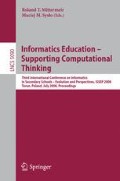Abstract
Learning Objects (LOs) are digital resources that can be used (and reused) to support the learning process. Generative Learning Objects (GLOs) are generic and reusable LOs from which the specific LO content can be generated on demand. We discuss the technological aspects required for implementing the GLOs: (1) variability modeling using feature diagrams, (2) multi-dimensional separation of the LO design concerns, (3) multiple languages for implementing a LO specification, (4) an external metalanguage for implementing parameterization, generalization and modification of a LO, and (5) heterogeneous metaprogramming techniques for generating LO instances from the generic LO specifications on demand. An example of a GLO for teaching array sorting algorithms in a programming curriculum is presented.
Access this chapter
Tax calculation will be finalised at checkout
Purchases are for personal use only
Preview
Unable to display preview. Download preview PDF.
References
Learning Technology Standards Committee. IEEE Standard for Learning Object Metadata. IEEE Standard 1484.12.1. IEEE, New York (2002)
Wiley, D.A.: Learning Object Design and Sequencing Theory. PhD Thesis, Department of Instructional Psychology and Technology, Brigham Young University (June 2000)
Fournier-Viger, P., Mayers, A., Najjar, M., Nkambou, R.: A Cognitive and Logic Based Model for Building Glass-Box Learning Objects. Interdisciplinary Journal of Knowledge and Learning Objects 2, 77–94 (2006)
Pankratius, V.: Aspect-Oriented Learning Objects. In: Proc. of the 4th IASTED Int. Conf. on Web-Based Education (WBE 2005), Grindelwald, Switzerland, February 21-23 (2005)
Berlanga, A., Garcia, F.J.: A Proposal to Define Adaptive Learning Designs. In: Proc. of Workshop on Applications of Semantic Web Technologies for Educational Adaptive Hypermedia (SW-EL 2004) in AH 2004, Eindhoven, The Netherlands, August 23, 2004, pp. 354–358 (2004)
Mohan, P., Brooks, C.: Engineering a Future for Web-based Learning Objects. In: Cueva Lovelle, J.M., Rodríguez, B.M.G., Gayo, J.E.L., Ruiz, M.d.P.P., Aguilar, L.J. (eds.) ICWE 2003. LNCS, vol. 2722, pp. 120–123. Springer, Heidelberg (2003)
Wiley, D.A.: Connecting learning objects to instructional design theory: A definition, a metaphor, and a taxonomy. In: Wiley, D.A. (ed.) The Instructional Use of Learning Objects (2000)
Fowler, M.: UML Distilled: A Brief Guide to the Standard Object Modeling Language, 3rd edn. Addison-Wesley, Reading
Leeder, D., Boyle, T., Morales, R., Wharrad, H., Garrud, P.: To boldly GLO - Towards the Next Generation of Learning Objects. In: World Conference on e-Learning in Corporate, Government, Healthcare and Higher Education, Washington, USA, November 2004, pp. 28–33 (2004)
Morales, R., Leeder, D., Boyle, T.: A Case in the Design of Generative Learning Objects (GLO): Applied Statistical Methods GLOs. In: Proc. of World Conference on Educational Multimedia, Hypermedia and Telecommunications (ED-MEDIA 2005), Montreal, Canada, June 27-July 2, 2005, pp. 302–310 (2005)
Merrill, M.D.: Instructional Transaction Theory (ITT): Instructional Design Based on Knowledge Objects. In: Reigeluth, C.M. (ed.) Instructional-Design Theories and Models: A New Paradigm of Instructional Theory. Lawrence Erlbaum Associates, Mahwah (2000)
Štuikys, V., Damaševičius, R.: Scripting Language Open PROMOL and its Processor. Informatica 11(1), 71–86 (2000)
Coplien, J., Hoffman, D., Weiss, D.: Commonality and Variability in Software Engineering. IEEE Software, 37–45 (November/December 1998)
Sametinger, J.: Software Engineering with Reusable Components. Springer, Heidelberg (1997)
Sheard, T.: Accomplishments and Research Challenges in MetaProgramming. In: Taha, W. (ed.) SAIG 2001. LNCS, vol. 2196, pp. 2–44. Springer, Heidelberg (2001)
Štuikys, V., Damaševičius, R., Montvilas, M.: A Metaprogramming-Based model for Generation of the eLearning-Oriented WEB Pages. In: Boyle, T., Oriogun, P., Pakstas, A. (eds.) Proc. of 2nd Int. Conf. on Information Technology: Research and Education (ITRE 2004), London, England, June 28-July 1, 2004, pp. 64–68 (2004)
Štuikys, V., Damaševičius, R.: Towards Knowledge-Based Generative Learning Objects. Information Technology and Control 36(2), 202–212 (2007)
Kang, K., Cohen, S., Hess, J., Novak, W., Peterson, S.: Feature-Oriented Domain Analysis (FODA) Feasibility Study. Technical Report CMU/SEI-90-TR-21, Software Engineering Institute, Carnegie Mellon University (November 1990)
Eisenecker, U.W., Czarnecki, K.: Generative Programming: Methods, Tools, and Applications. Addison-Wesley, Reading (2000)
Kang, K.C., Lee, J., Donohoe, P.: Feature-Oriented Product Line Engineering. IEEE Software 19(4), 58–65 (2002)
Clements, P., Northrop, L.: Software Product Lines: Practices and Patterns. Addison-Wesley, Boston (2002)
MacGregor, J.: Requirements Engineering in Industrial Product Lines. In: Proc. of Int. Workshop on Requirements Engineering for Product Lines REPL 2002, Essen, Germany, pp. 5–11 (2002)
Czarnecki, K., Kim, C.H.P., Kalleberg, K.T.: Feature models are views on ontologies. In: Proc. of 10th Int. Software Product Line Conference (SPLC 2006), Baltimore, Maryland, USA, August 21-24, 2006, pp. 41–51 (2006)
Štuikys, V., Damaševičius, R., Brauklytė, I., Limanauskienė, V.: Exploration of Learning Object Ontologies Using Feature Diagrams. In: World Conference on Educational Multimedia, Hypermedia & Telecommunications (ED-MEDIA), Vienna, Austria, June 30-July 4 (2008)
Guizzardi, G.: On Ontology, ontologies, Conceptualizations, Modeling Languages, and (Meta)Models. In: Vasilecas, O., Edler, J., Čaplinskas, A. (eds.) Frontiers in Artificial Intelligence and Applications, Databases and Information Systems IV. IOS Press, Amsterdam (2007)
Simos, M., Creps, R., Klingler, C., Lavine, L.: Software Technology for Adaptable Reliable Systems (STARS). Organization Domain Modeling (ODM) Guidebook, v. 1.0 (1998)
Ossher, H., Tarr, P.: Multi-Dimensional Separation of Concerns and The Hyperspace Approach. In: Aksit, M. (ed.) Software Architectures and Component Technology: The State of the Art in Software Development. Kluwer Academic Publishers, Dordrecht (2000)
Kleinjohann, B.: Invited Talk: Multilanguage Design. In: Proc. of Int. IFIP WG 10.3/WG 10.5 Workshop on Distributed and Parallel Embedded Systems (DIPES 1998), Paderborn, Germany, pp. 23–38 (1998)
Damaševičius, R., Štuikys, V.: Separation of Concerns in Multi-language Specifications. Informatica 13(3), 255–274 (2002)
Fischer, G., Giaccardi, E.: MetaDesign: A Framework for the Future of End-User Development. In: Lieberman, H., Paternò, F., Wulf, V. (eds.) End User Development - Empowering People to Flexibly Employ Advanced Information and Communication Technology. Kluwer Academic Publishers, Dordrecht (2004)
Author information
Authors and Affiliations
Editor information
Rights and permissions
Copyright information
© 2008 Springer-Verlag Berlin Heidelberg
About this paper
Cite this paper
Damaševičius, R., Štuikys, V. (2008). On the Technological Aspects of Generative Learning Object Development. In: Mittermeir, R.T., Sysło, M.M. (eds) Informatics Education - Supporting Computational Thinking. ISSEP 2008. Lecture Notes in Computer Science, vol 5090. Springer, Berlin, Heidelberg. https://doi.org/10.1007/978-3-540-69924-8_31
Download citation
DOI: https://doi.org/10.1007/978-3-540-69924-8_31
Publisher Name: Springer, Berlin, Heidelberg
Print ISBN: 978-3-540-69923-1
Online ISBN: 978-3-540-69924-8
eBook Packages: Computer ScienceComputer Science (R0)

